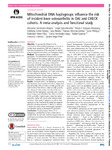Mostrar o rexistro simple do ítem
Mitochondrial DNA haplogroups influence the risk of incident knee osteoarthritis in OAI and CHECK cohorts: a meta-analysis and functional study
| dc.contributor.author | Fernández-Moreno, Mercedes | |
| dc.contributor.author | Soto-Hermida, Ángel | |
| dc.contributor.author | Vázquez-Mosquera, María E. | |
| dc.contributor.author | Cortés-Pereira, Estefanía | |
| dc.contributor.author | Relaño, Sara | |
| dc.contributor.author | Hermida Gómez, Tamara | |
| dc.contributor.author | Pértega-Díaz, Sonia | |
| dc.contributor.author | Oreiro, Natividad | |
| dc.contributor.author | Fernández-López, Carlos | |
| dc.contributor.author | Garesse, Rafael | |
| dc.contributor.author | Blanco García, Francisco J | |
| dc.contributor.author | Rego-Pérez, Ignacio | |
| dc.date.accessioned | 2020-03-23T11:23:58Z | |
| dc.date.available | 2020-03-23T11:23:58Z | |
| dc.date.issued | 2016-12-05 | |
| dc.identifier.citation | Fernández-Moreno M, Soto-Hermida A, Vázquez-Mosquera ME, Cortés-Pereira E, Relaño S, Hermida-Gómez T, et al. Mitochondrial DNA haplogroups influence the risk of incident knee osteoarthritis in OAI and CHECK cohorts: a meta-analysis and functional study. Ann Rheum Dis. 2017;76(6): 1114-1122 | es_ES |
| dc.identifier.issn | 0003-4967 | |
| dc.identifier.uri | http://hdl.handle.net/2183/25210 | |
| dc.description | Extended report | es_ES |
| dc.description.abstract | [Abstract] Objective To evaluate the influence of the mitochondrial DNA (mtDNA) haplogroups in the risk of incident knee osteoarthritis (OA) and to explain the functional consequences of this association to identify potential diagnostic biomarkers and therapeutic targets. Methods Two prospective cohorts contributed participants. The osteoarthritis initiative (OAI) included 2579 subjects of the incidence subcohort, and the cohort hip and cohort knee (CHECK) included 635, both with 8-year follow-up. The analysis included the association of mtDNA haplogroups with the rate of incident knee OA in subjects from both cohorts followed by a subsequent meta-analysis. Transmitochondrial cybrids harbouring haplogroup J or H were constructed to detect differences between them in relation to physiological features including specific mitochondrial metabolic parameters, reactive oxygen species production, oxidative stress and apoptosis. Results Compared with H, the haplogroup J associates with decreased risk of incident knee OA in subjects from OAI (HR=0.680; 95% CI 0.470 to 0.968; p<0.05) and CHECK (HR=0.728; 95% CI 0.469 to 0.998; p<0.05). The subsequent meta-analysis including 3214 cases showed that the haplogroup J associates with a lower risk of incident knee OA (HR=0.702; 95% CI 0.541 to 0.912; p=0.008). J cybrids show a lower free radical production, higher cell survival under oxidative stress conditions, lower grade of apoptosis as well as lower expression of the mitochondrially related pro-apoptotic gene BCL2 binding component 3 (BBC3). In addition, J cybrids also show a lower mitochondrial respiration and glycolysis leading to decreased ATP production. Conclusions The physiological effects of the haplogroup J are beneficial to have a lower rate of incident knee OA over time. Potential drugs to treat OA could focus on emulating the mitochondrial behaviour of this haplogroup. | es_ES |
| dc.description.sponsorship | Instituto de Salud Carlos III; CIBERCB06/01/0040-Spain | es_ES |
| dc.description.sponsorship | Instituto de Salud Carlos III; RETIC-RIER-RD12/0009/0018 | es_ES |
| dc.description.sponsorship | Instituto de Salud Carlos III; PI14/01254 | es_ES |
| dc.description.sponsorship | Instituto de Salud Carlos III; CP12/03192 | es_ES |
| dc.language.iso | eng | es_ES |
| dc.publisher | BMJ | es_ES |
| dc.relation.uri | http://dx.doi.org/10.1136/annrheumdis-2016-210131 | es_ES |
| dc.rights | Atribución-NoComercial 3.0 España | es_ES |
| dc.rights.uri | http://creativecommons.org/licenses/by-nc/3.0/es/ | * |
| dc.subject | Epidemiology | es_ES |
| dc.subject | Gene polymorphism | es_ES |
| dc.subject | Knee osteoarthritis | es_ES |
| dc.title | Mitochondrial DNA haplogroups influence the risk of incident knee osteoarthritis in OAI and CHECK cohorts: a meta-analysis and functional study | es_ES |
| dc.type | info:eu-repo/semantics/article | es_ES |
| dc.rights.access | info:eu-repo/semantics/openAccess | es_ES |
| UDC.journalTitle | Annals of the Rheumatic Diseases | es_ES |
| UDC.volume | 76 | es_ES |
| UDC.issue | 6 | es_ES |
| UDC.startPage | 1114 | es_ES |
| UDC.endPage | 1122 | es_ES |
Ficheiros no ítem
Este ítem aparece na(s) seguinte(s) colección(s)
-
INIBIC- REUMA - Artigos [184]







